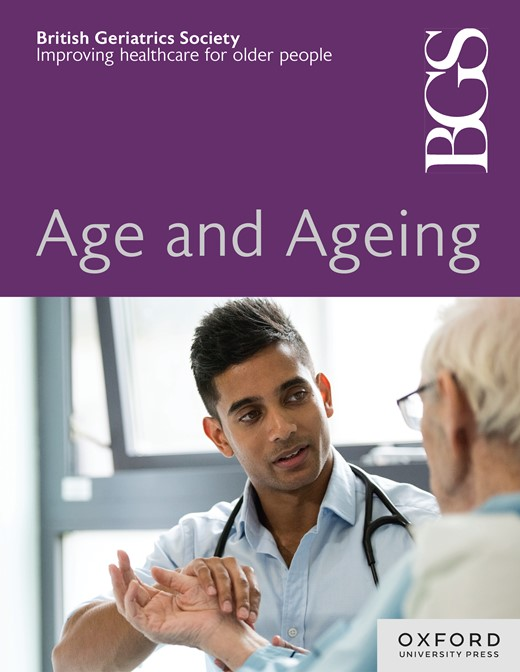Engaging with First Line Nutrition Information - Insights from Health Care Professionals and Older Persons
IF 6
2区 医学
Q1 GERIATRICS & GERONTOLOGY
引用次数: 0
Abstract
Background Health care professionals (HCPs) working with older persons are often asked nutrition related questions. This study explored how first line nutrition information such as general leaflets are accessed and used by HCPs and older persons. Is there a role for video-based nutrition education? Methods HCPs working with older persons completed an online survey. An older person’s reference group participated in a virtual focus group. Participants were asked about knowledge seeking, accessing and providing nutrition information, and engaging with videos on nutrition topics. Results were analysed using descriptive statistics and thematic analysis. Results Ninety five HCPs completed the survey (44% Nursing, 27% Physiotherapy, 14% Occupational Therapy, 6% Speech & Language Therapy and 9% other (doctors, social worker, pharmacist and care needs facilitator).Eighty-eight (90%) HCPs reported being asked nutrition related questions, topics included poor appetite (n=77, 83%), weight loss (n=68, 75%) and constipation (n=66, 72%).Twenty HCPs (21%) reported confidence answering questions, while 28 (29%) reported low confidence. Forty-three (44%) had little or no awareness of available first line information and 37 (39%) rarely or never provided information. Eighty-two (86%) HCPs agreed that nutrition education videos would be used if available. Three themes emerged from the HCPs survey: (i) importance of nutrition for HCPs (ii) barriers to use of first line information and (iii) support systems. Fourteen persons (64% women, 36% men) attended the focus group. Two themes were identified: (i) access to health information and (ii) barriers to access. Discussions included difficulty in proactively seeking information, joined up sharing and that education videos would be beneficial, but the distribution needed consideration. Conclusion Timely access to information is empowering for the older person. HCPs were identified as a resource for seeking nutrition advice. The communication of and access to nutrition information merits consideration. Following these findings, nutrition videos are currently being developed.接触第一线营养信息--来自医疗保健专业人员和老年人的见解
背景 与老年人打交道的医疗保健专业人员(HCPs)经常会被问到与营养有关的问题。本研究探讨了医护人员和老年人如何获取和使用普通传单等一线营养信息。视频营养教育是否可以发挥作用?方法 为老年人服务的保健医生完成了一项在线调查。一个老年人参考小组参加了一个虚拟焦点小组。调查询问了参与者有关知识寻求、获取和提供营养信息以及观看营养主题视频的情况。调查结果采用描述性统计和主题分析法进行分析。结果 95 名保健专业人员完成了调查(44% 护理人员、27% 物理治疗人员、14% 职业治疗人员、6% 言语治疗人员和 9% 其他人员(医生、社工、药剂师和护理需求促进人员))。88 名保健专业人员(90%)表示曾被问及与营养相关的问题,主题包括食欲不振(人数=77,83%)、体重减轻(人数=68,75%)和便秘(人数=66,72%)。43人(44%)对可用的一线信息知之甚少或一无所知,37人(39%)很少或从未提供过信息。82(86%)名保健医生同意在有营养教育视频的情况下使用。在对保健医生的调查中发现了三个主题:(i) 营养对保健医生的重要性;(ii) 使用一线信息的障碍;(iii) 支持系统。14 人(64% 为女性,36% 为男性)参加了焦点小组。确定了两个主题(i) 获取健康信息;(ii) 获取信息的障碍。讨论内容包括主动寻求信息的困难、联合共享以及教育视频的好处,但需要考虑视频的分发问题。结论 及时获取信息对老年人来说是一种能力。保健医生被认为是寻求营养建议的资源。营养信息的传播和获取值得考虑。根据这些发现,目前正在制作营养视频。
本文章由计算机程序翻译,如有差异,请以英文原文为准。
求助全文
约1分钟内获得全文
求助全文
来源期刊

Age and ageing
医学-老年医学
CiteScore
9.20
自引率
6.00%
发文量
796
审稿时长
4-8 weeks
期刊介绍:
Age and Ageing is an international journal publishing refereed original articles and commissioned reviews on geriatric medicine and gerontology. Its range includes research on ageing and clinical, epidemiological, and psychological aspects of later life.
 求助内容:
求助内容: 应助结果提醒方式:
应助结果提醒方式:


